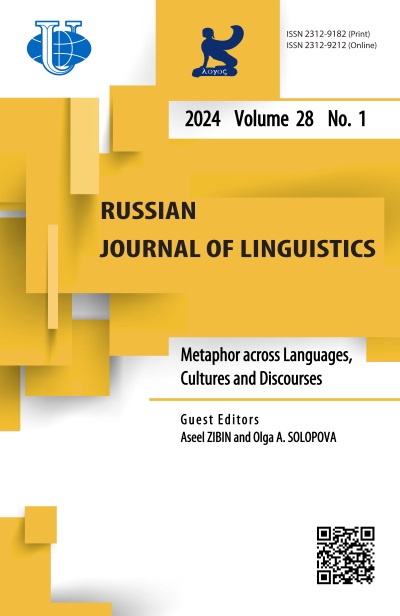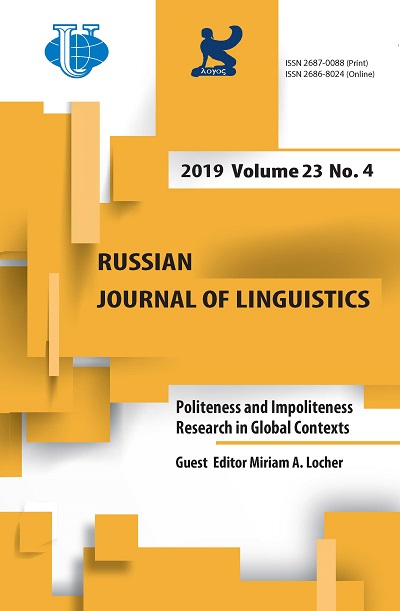The 12th International Conference on (Im)Politeness (Cambridge, Anglia Ruskin University 17-19 July, 2019): A Report
- Authors: Parvaresh V.1
-
Affiliations:
- Anglia Ruskin University
- Issue: Vol 23, No 4 (2019): Politeness and Impoliteness Research in Global Contexts
- Pages: 1122-1127
- Section: CONFERENCES
- URL: https://journals.rudn.ru/linguistics/article/view/22535
- DOI: https://doi.org/10.22363/2687-0088-2019-23-4-1122-1127
Cite item
Full Text
Abstract
About the authors
Vahid Parvaresh
Anglia Ruskin University
Email: Vahid.Parvaresh@anglia.ac.uk
Senior Lecturer in the School of Humanities and Social Sciences at Anglia Ruskin University, UK East Rd, Cambridge CB1 1PT
References
- Bousfield, Derek (2008). Impoliteness in Interaction. Amsterdam: John Benjamins.
- Brown, Penelope & Stephen C. Levinson (1987). Politeness: Some Universals in Language Usage. Cambridge: Cambridge University Press.
- Culpeper, Jonathan. (2011). Impoliteness: Using Language to Cause Offence. Cambridge: Cambridge University Press.
- Culpeper, Jonathan (2013). Impoliteness: Questions and answers. In Denis Jamet & Manuel Jobert (eds.), Aspects of Linguistic Impoliteness (pp. 2-15). Newcastle upon Tyne: Cambridge Scholars Publishing.
- Culpeper, Jonathan, Michael Haugh & Daniel Z. Kádár (2017). Introduction. In Jonathan Culpeper, Michael Haugh & Daniel Z. Kádár (eds.), The Palgrave Handbook of Linguistic (Im)Politeness (pp. 1-8). London: Palgrave Macmillan.
- Haidt, Jonathan (2012). The Righteous Mind: Why Good People Are Divided by Politics and Religion. New York: Vintage.
- Haugh, Michael (2015). Impoliteness and taking offence in initial interactions. Journal of Pragmatics, 86, 36-42.
- Haugh, Michael & Valeria Sinkeviciute (2019). Offence and conflict talk. In Matthew Evans, Lesley Jeffries & Jim O'Driscoll (eds.), The Routledge Handbook of Language in Conflict (pp. 196-214) Abingdon, Oxon: Routledge.
- Jucker, Andreas H. (2012). Changes in politeness cultures. In Terttu Nevalainen & Elizabeth Closs Traugott (eds.). Handbook of the History of English. Oxford: Oxford University Press.
- Kádár, Daniel. Z. & Michael Haugh (2013). Understanding Politeness. Cambridge: Cambridge University Press.
- Kádár, Daniel Z., Vahid Parvaresh & Puyu Ning (2019). Morality, moral order, and language conflict and aggression: A position paper. Journal of Language Aggression and Conflict, 7(1), 6-31.
- Kelly, Michael, Hilary Footitt & Myriam Salama-Carr (eds.). (2019). The Palgrave Handbook of Languages and Conflict. London: Palgrave Macmillan.
- Locher, Miriam A. & Brook Bolander (2019). Ethics in pragmatics. Journal of Pragmatics, 145, 83-90.
- Mey, Jacob. (2001). Pragmatics: An Introduction (2nd edn). Oxford: Blackwell.
- Parvaresh, Vahid. (2019). Moral impoliteness. Journal of Language Aggression and Conflict, 7 (1), 79-104.
- Parvaresh, Vahid & Alessandro Capone (eds.). (2017). The Pragmeme of Accommodation: The Case of Interaction around the Event of Death. Cham, Switzerland: Springer.
- Rahim, Afzalur (2017). Managing Conflict in Organisations. London: Routledge.
- Tayebi, Tahmineh (2016). Why do people take offence? Exploring the underlying expectations. Journal of Pragmatics, 101, 1-17.
- Yus, Francisco (2019). An outline of some future research issues for internet pragmatics. Internet Pragmatics, 2(1), 1-33.

















